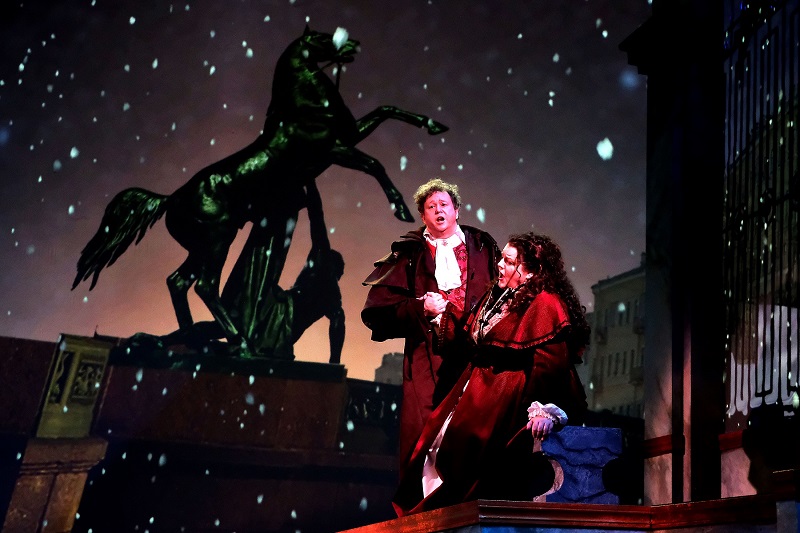
Opera Resounds, despite Adversity
PALO ALTO, CA—World-renowned are Stanford University’s technology expertise and her women’s sports teams. But across town, there’s a little miracle called West Bay Opera, which despite a postage-stamp-sized auditorium to play in, brings off productions that are both presentable and downright moving.
Cheers rang out with WBO resuming performances after the two-year Covid padlock, hitting its stride in its 66th season.
Imagine a theater incapable of scene changes. Half the musicians are sitting in the wings like caged birds, barely able to see the baton of conductor Juan Luis Moscovich, who must also double as WBO general director. And in Tchaikovsky’s “Queen of Spades,” you have armies of performers including some unpaid choruses, walk-ons, children, and a trio of Commedia dell’Arte dancer-singers who nearly stole the show in their cameo (at least, when not hopscotching over footlights).
The phoenix rising from the viral ashes May 20—-a fateful drama about gambling, gamboling, and the supernatural—came off powerfully at the heart of the matter, at least if you didn’t examine the edges too much. The cast sang in Russian. And if your vocabulary never went beyond “Tri karti” (3 cards) and “Ya vas lyublyu” (I love you), you had the projected text translations to help out.
It has weaknesses common to the genre, like pieces stopping the drama dead in its tracks with irrelevant choral scenes—once proclaiming a sunny day, later judging it a stormy day. Judicious cuts would help. (Verdi’s Italian operas to their credit eliminated those fillers with choruses propelling the action or juicy subplots to replace fillers.) But the racy central story, with assignations and secret rendezvous, is engrossing: a man, Hermann, caught between a love interest in Liza and an obsession for gambling at cards in scenes of the elegant czarist aristocracy. He loves the gaming table more, literally forcing an old clairvoyant Countess to divulge future outcomes and enable him to make his fortune. In the end the ghost of the victimized Countess thwarts his greed with a flawed prediction. The turning up of the queen of spades in the casino leads to his merited end.
WBO made the seven-scene opera work through dazzling architectural projections. The masterful touch was a lovers’ quarrel at the walls of the canal where, as if in a video, the image slowly shifts to the canal waters, showing the demise in a watery suicide—a great touch by projection designer Peter Compton.
The heavy-weight voices of Michael Boley (Hermann) and Rhoslyn Jones (Liza) rang through the hall and rafters with power and authority. They cautiously tended to the sharp side vocally to skirt tending flat. Jones’ surprising mobility added plausibility to the doomed pair. In the scene-stealing secondary role of the Countess, mezzo Laure de Marcellus proved to be the night’s best actress. In strong supporting low voices of nobles came Kiril Havezov (Tomsky) and Jonathan Beyer (Yelensky).
Your sympathies had to be with WBO, playing a 19th-century Russian opera at a time of great public antipathy toward Russians, a factor definitely cutting into attendance at the opener. But given the many months of contracted operatic preparation, WBO was hardly in a position to substitute “Otello,” “Mme. Butterfly” or “Porgy and Bess.”
Stage Director Ragnar Conde did some of his best work staging the song-and-dance trio of Commedia dell’arte performers Sarah Benzinger, Maria Kaganskaya and Kiril Havezov in the Masked Ball scene.
For the audience, VAXX ID was required and masks strongly recommended.
TCHAIKOVSKY’S OPERA “PIQUE DAME” (Queen of Spades), by West Bay Opera, Lucie Stern Theatre, Palo Alto, through May 29. In Russian, with supertitles. 3.5 hrs. with three acts, two intermissions. For info: (650) 424-9999, or go online: www.wbopera.org.